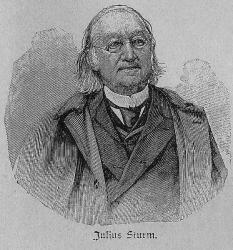Planning worship?
Check out our sister site, ZeteoSearch.org,
for 20+ additional resources related to your search.
- |
User Links
Person Results
Edmund S. Lorenz

1854 - 1942 Person Name: E. S. Lorenz Composer of "[Wie sollt' ich Dich nicht lieben]" in Lob und Ehre Pseudonymns: John D. Cresswell, L. S. Edwards, E. D. Mund,
====================
Lorenz, Edmund Simon. (North Lawrence, Stark County, Ohio, July 13, 1854--July 10, 1942, Dayton, Ohio). Son of Edward Lorenz, a German-born shoemaker who turned preacher, served German immigrants in northwestern Ohio, and was editor of the church paper, Froehliche Botschafter, 1894-1900.
Edmund graduated from Toledo High School in 1870, taught German, and was made a school principal at a salary of $20 per week. At age 19, he moved to Dayton to become the music editor for the United Brethren Publishing House. He graduated from Otterbein College (B.A.) in 1880, studied at Union Biblical Seminary, 1878-1881, then went to Yale Divinity School where he graduated (B.D.) in 1883. He then spent a year studying theology in Leipzig, Germany.
He was ordained by the Miami [Ohio] Conference of the United Brethren in Christ in 1877. The following year, he married Florence Kumler, with whom he had five children. Upon his return to the United States, he served as pastor of the High Street United Brethren Church in Dayton, 1884-1886, and then as president of Lebanon Valley College, 1887-1889.
Ill health led him to resign his presidency. In 1890 he founded the Lorenz Publishing Company of Dayton, to which he devoted the remainder of his life. For their catalog, he wrote hymns, and composed many gospel songs, anthems, and cantatas, occasionally using pseudonyms such as E.D. Mund, Anna Chichester, and G.M. Dodge. He edited three of the Lorenz choir magazines, The Choir Leader, The Choir Herald, and Kirchenchor. Prominent among the many song-books and hymnals which he compiled and edited were those for his church: Hymns for the Sanctuary and Social Worship (1874), Pilgerlieder (1878), Songs of Grace (1879), The Otterbein Hymnal (1890), and The Church Hymnal (1934).
For pastors and church musicians, he wrote several books stressing hymnody: Practical Church Music (1909), Church Music (1923), Music in Work and Worship (1925), and The Singing Church (1938). In 1936, Otterbein College awarded him the honorary D.Mus. degree and Lebanon Valley College the honorary LL.D. degree.
--Information from granddaughter Ellen Jane Lorenz Porter, DNAH Archives
Edmund S. Lorenz
Julius Carl Reinhold Sturm

1816 - 1896 Person Name: Julius Sturm Author of "Wo sollt' ich Dich nicht lieben" in Lob und Ehre Sturm, Julius Carl Reinhold, was born July 21, 1816, at Köstritz, in the principality of Reuss (younger line). After being a student of theology at Jena, from 1837 to 1841, he was for two years a private tutor at Heilbronn on the Neckar, and then, for a year, at Friesen, in Saxony. In 1845 he became tutor to Prince Heinrich xiv. of Reuss; and after the Prince's confirmation, in 1848, acted as tutor to him for three years more at the Gymnasium in Meiningen. He was then appointed pastor at Göschitz, near Schleiz, in the end of 1850; and pastor at Köstritz, in 1858, where he still (1889) lives as Kirchenrath and Court preacher (Koch, vii. 284; ms. from the author, &c). Sturm is one of the most important of modern German sacred poets. Among his works of this nature may be mentioned:—
(1) Gedichte, Leipzig, 1850; 3rd ed., 1862. (2) Fromme Lieder, Leipzig, 1852; 6th ed., 1867. (3) Zwei Rosen, oder das holte Lied der Liebe, Leipzig, 1854: a version of Canticles. (4) Neue fromme Lieder und Gedichte, Leipzig, 1858; 2nd ed., 1870. (5) Israel's Weg zur Herrlichkeit, Erlangen, 1858; 2nd ed., as Israelitische Lieder, Halle, 1867. (6) Von der Pilgerfahrt, Halle, 1868. (7) Gott grüsse dich. Religiöse Gedichte, Leipzig, 1876. (8) Aufwärtz, Leipzig, 1881. (9) Ich bau auf Gott. Neue religiöse Gedichte, Bremen, 1883. (10) Palme und Krone, Bremen, 1888.
From these works a large number of pieces have passed into recent collections of German sacred poetry, and a few into recent German official hymnbooks. A considerable number have been translation by Lady John Manners, the Rev. J. Kelly, and others, but none have passed into English hymnbooks. [Rev. James Mearns, M.A.]
-- John Julian, Dictionary of Hymnology (1907)
Julius Carl Reinhold Sturm


 My Starred Hymns
My Starred Hymns


